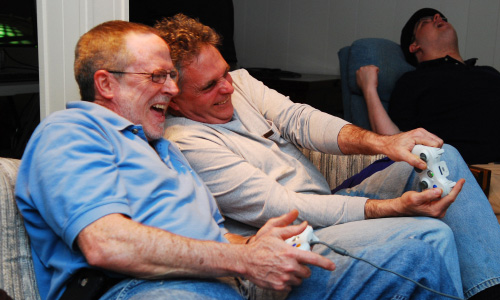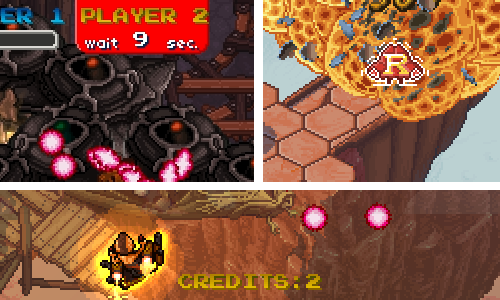
Pictured: Tim's dad and uncle demonstrating the target experience as Hal swoons in the background.
All Ages
Besides jockeying for score & in-game resources, another anti-pattern that we saw a lot in older co-op games was the way mixed-skill play was implicitly discouraged by the game’s mechanics. In a game where everyone’s drawing from the same pool of lives and resources, a weaker player who dies frequently is entirely capable of torpedoing their entire team’s chances at fun and success. Plus, inexperienced players spend too much of their session in “downtime,” waiting around for another round to start so that they can have another shot at enjoying the game. As a result, resentment and un-fun is the flavor that people remember from the experience.
We wanted Jamestown to be a game where any group of players, with any mix of age, gender, and genre fluency, could have a great time playing together. To achieve that, we made it a mantra of ours that the strongest player on a team should never feel compelled to shame the weakest.
Easy (and kinda inspirational!) to say, but very difficult to accomplish in a genre where life and death are only ever separated by a single player error. Indeed, minimal error-tolerance is essential to what makes this sort of game fun and thrilling. However, because of the concerted effort required from the players who are motivated to truly succeed, it also fosters a large skill gap between new players and seasoned old-timers. That emphasis on perfect play (clearly represented by the lack of a health-bar that allows for multiple hits) is one of those design decisions that sits at the heart of almost every other “authentic” aspect of the genre. To ignore it is, in many ways, to make a non-shmup.
Which presented us with a problem: without breaking that cardinal rule of shoot-em-ups, how could we keep death punishing enough for players to work hard at avoiding it, while at the same time softening the penalty for failure sufficient to keep new players interested? And how could we ensure that no single player was ever a target for blame from the others?

The key elements
After trying several wrong answers, here are the ones we decided were right:
-
Implement a respawn timer that gets longer with every player-death. This way you have a good soft incentive not to die constantly, but even when you’re dead, you still have something to look forward to. It also dramatically reduces overall downtime, which is great for player engagement.
-
Do away with lives and use a credits-based system, whereby only the simultaneous death of the entire team can result in the loss of a credit. This way, you only truly penalize the team when each member of that team has failed, instead of singling out individuals. This also creates a system that can accommodate a LOT of individual player deaths without depleting a super-valuable resource.
- Add a power-up item called a “Revive Token” that can bring some or all of your dead teammates back to life instantly. This means that anyone can grab this item and save the day for their entire team, regardless of overall shmupping skill.
Those three changes resulted in a night-and-day transformation of the player dynamic in co-op. Suddenly players were hollering encouragement to each other, announcing their deaths, counting down the seconds until their respawns, and most importantly, sharing their successes and failures equally. New players, especially, loved the feeling of plucking the whole team’s victory from the jaws of defeat (an unusual feeling if you’re used to being the weakest player in the room!), and the experts in the room were always quick with their praise for those rescue missions.
When making tweaks to the formula of such an established genre, we did our best to increase the accessibility of the fun in Jamestown without sacrificing the things that are important and enjoyable to serious shoot-em-up fans. We considered the hard-core to be just as valuable as our other customers, and while nothing’s perfect, we’re very proud of the way our game performs that balancing act.